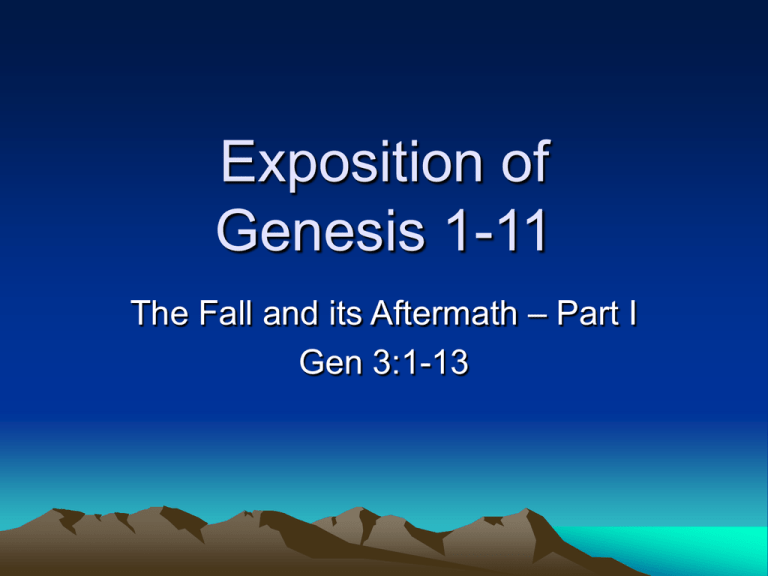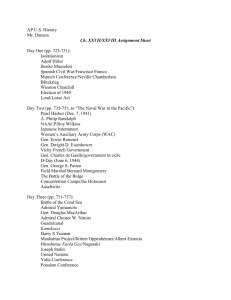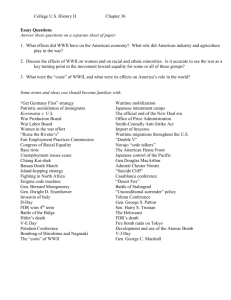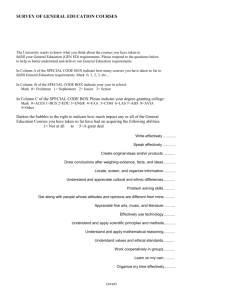The Book of Beginnings - Berachah Bible Church
advertisement

Exposition of Genesis 1-11 The Fall and its Aftermath – Part I Gen 3:1-13 What We’ve Covered So Far • The Creation of the Heavens and the Earth – Gen 1:1 – 2:3 • The Creation of Man and Woman and the Garden of Eden – Gen 2:4-25 – Both of these prepare us for the drastic change that will take place in chapter 3. – For Moses original audience, all that is in these first 11 chapters provides them with background on their current status as God’s people. Relationship between Sections • Gen 2:8-17 – Paradise Gained! – – – – Life Pleasure Abundance Harmony with God • Gen 3:1-24 – Paradise Lost! – – – – Death Pain Sustenance by toil Alienation from God The Serpent Deceives the Woman (Gen 3:1-5) • The serpent is described as more “crafty, shrewd, clever” than all the beasts which the Lord God had more. – The word itself does not carry a negative connotation; context determines this. – How do we know that the serpent speaks the words of Satan? • Satan’s initial modus operandi in the garden is to create confusion about the Lord’s instruction to Adam; subsequently he directly contradicts it. The Serpent Deceives the Woman (Gen 3:1-5) • Woman’s initial response is correct: It is not that the Lord has forbidden any tree; they are free to eat of all the trees except one. If they eat from that one, they will die. – Some have made much “or touch it” as something added by the woman and not part of the Lord’s original instruction...the point is that there were to stay away from that tree. • Satan’s reply: “You surely shall not die!” – Notice he says “For God knows...” Again, part of what Satan says is true. Their eyes would be opened to know good and evil, but at a cost of disobedience to God’s explicit command and with tragic consequences. The Serpent Deceives the Woman (Gen 3:6-7) • As the woman contemplated the situation, she considered three aspects of the fruit of this tree. It was: – good for food – had attractive fruit, like the other trees. – a delight to the eyes – both by its physical beauty and by the “eye-opening” that it would provide. – desirable to make one wise – not just pleasant to the physical eye, but also appealing in the knowledge it would provide. • After some period of such contemplation, the woman took the fruit and ate it, and gave it to her husband who was with her, who also ate. Man & Woman Eat the Forbidden Fruit (Gen 3:6-7) • Their eyes were indeed opened, but not with the benefit they expected. – They had hoped to gain divine knowledge...instead they learned that they were naked! – Notice the contrast before and after the Fall: • 2:25: “And the man and his wife were both naked and were not ashamed.” • 3:7: “Then the eyes of both of them were opened, and they knew that they were naked; and they sewed fig leaves together and made themselves loin coverings. ” – In a state of innocence before the Fall, in a state of disobedience after. God Confronts Them in their Sin (Gen 3:8-13) • God’s “walking” in the garden is an anthropomorphism...but He clearly came to the area where the man and woman were, and they knew He was there because they heard Him. – Precisely what they heard is not stated. • In contrast to the time before they ate of the forbidden tree, they are now uneasy in God’s presence because of their guilt, and thus hid themselves among the trees. – Of course, it is vain to try and hide from the Lord. God Confronts Them in their Sin (Gen 3:8-13) • The Lord God called out to the man first, for he is the responsible party. • Through a series of questions, the Lord puts the man on trial. These questions are not seeking information, but confession. – “Where are you?” • Adam confesses that he heard God in the garden, was afraid because he was naked (and now knew it), and hid. God Confronts Them in their Sin (Gen 3:8-13) • “Who told you that you naked? Have you eaten of the tree from which I commanded you not to eat?” – Adam’s reply is true according to the account, but he seeks to lessen his own guilt by directly blaming the woman and indirectly blaming God...characteristic of sinful man! • Since Adam mentions the woman, God now turns to her: “What is this you have done?” – The woman’s reply is also faithful to the account, but also blaming someone else. The Fall and its Aftermath Part II Gen 3:14-25







